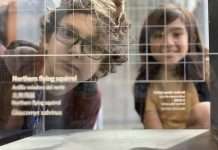
Yesterday I was at the park watching my five-year-old daughter try to engage with a group of little girls.
There were four of them; they were about her age and they clearly knew one another, all happily soiling a similar school uniform.
Sara wanted to play with them, but she wasn’t quite sure how to gain entry into their circle.
Her approach was less direct and more stalker-like, as she kind of hovered very nearby, watching, hoping for an invitation.
Even though part of me thought, Mmmm, not sure that’s gonna work, the idea that anyone would not immediately sniff out this majestic creature in their midst and flock to her goodness felt viscerally insane. I don’t care how old you are. Dumb girls. Open your eyes.
I’ve spent Sara’s life making sure she knows that she is the most treasured human alive, beloved by all. So how come she seemed not so sure?
She was sure when she was four.
When Sara was four, she would have gone right in there without even thinking and in seconds made those girls believe there was no such thing as life before her. And then they’d carry on as though she’d been there all along.
What changed?
I blame social skills.
Up until kids are four, they are completely self-un-conscious. They are unaware of age, sex, size, appropriateness, turn-taking. Mirrors are still something they can press their faces up against and lick. People are something to smile at, hug, maybe step on.
Conversations can be had at any time, with anyone, at any volume, tears and laughter share equal space, and they can opt out of one moment and start fresh whenever, and for any reason, if they damn well please. And we don’t get mad at them. They are still relatively small enough and still have enough cheek square footage that we just leave them be.
We may ‘adult’ them in our actions, like physically move them off the restaurant table they’ve climbed on (with a quick “get down”), shoo them away from the neighbors tricycle (with a “no, no”), return their five-finger discount (with a “that’s not yours”), but we don’t over-explain things to them.
We lovingly guide them to safety (either theirs and/or anothers) and chalk most behavior up to ‘they don’t know any better.’
Until suddenly we think they should.
This happens at five.
Maybe it’s because they suddenly look more grown up—their cheeks thin out, they attend (real) school, and they have reviews where someone else is measuring their behavior, so we start measuring it too. We start teaching them social skills.
Social skills are not to be confused with kindness, or inclusion, or love, which children bring with them when they enter the world, and it’s our job not to let society pry these virtues from their grasp.
By social skills, I mean the outer layer of how we are expected to operate in a crowd.
Kids start to hear things like, “You shouldn’t act like that,” or “You should know better,” or “Be on your best behavior,” words no longer designed to keep them safe but to help them stay in society’s good graces (and ours).
Essentially, social skills teach us three things:
- That your behavior is something you can modify.
- That you can modify your behavior to get someone to like you.
- And that if after you’ve modified your behavior, as a result, someone(s) does like you, that’s a good thing.
Yesterday, I found myself simultaneously cursing that Sara seemed self-conscious while also wanting to will her to behave differently… stop trying so hard, appear more aloof or something, not to get something I wanted, but something she (clearly) wanted, I just wanted her to…
And then I remembered – social skills are exhausting.
I know I need to teach Sara many things to prepare her for this life including (healthy) social skills. I also know I didn’t teach Sara to be self-conscious, but by explaining to her how to act or behave (in any way) her self became an entity that is now visible to her, that she can now measure too.
What she needs to know every second of every day is that there is no measure to how much we love her, and as long as she knows that she will be fine, no matter what circle she is inside or out of.
So I stopped agonizing. I called her over, pulled her into my circle and gave her a good squeeze.
















